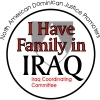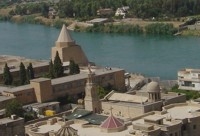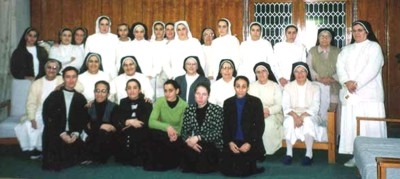


![]() Justice
HOME
Justice
HOME
![]() Call
to Action Document
Call
to Action Document
![]() Africa
Africa
![]() Colombia
Colombia
![]() Immigration
Immigration
![]() Iraq
Iraq
![]() Israel/Palestine
Israel/Palestine
![]() Human
Trafficking
Human
Trafficking
How much can people take?
March, 2006
Thoughts on coming home to Mosul, Iraq
Rihab Mousa, OP Dominican Sister
 After
three years being in United States going back home was a happy and
sad moment for me. Happy, because I was ready to see my community
and my family and sad, because I knew it would be very difficult
for me to see my country invaded by the United States. After three
years of living in the U. S., I didn't know whether I was ready
to be in the reality and inside the picture instead of being out
of the picture. In 2002 when I left my country, things were more
peaceful.
After
three years being in United States going back home was a happy and
sad moment for me. Happy, because I was ready to see my community
and my family and sad, because I knew it would be very difficult
for me to see my country invaded by the United States. After three
years of living in the U. S., I didn't know whether I was ready
to be in the reality and inside the picture instead of being out
of the picture. In 2002 when I left my country, things were more
peaceful.
I remember, in 2002, when I was leaving Iraq to go to Jordan to
fly to the United States, I kept turning to the back to memorize
what I saw behind me. I wanted to remember every detail I saw on
our way from behind so that when I returned I could say to myself,
“Ah, I am this much closer to my home." I wished I hadn’t
kept those pictures for three years in my memory. When I returned,
I never got to see those pictures in reality. All the places were
destroyed. I started to think about what Sr. Marie Therese Hanna
said in one of her speeches in the U.S., that the Iraqi people are
wounded more than the buildings. So I said to myself, if the buildings
are wounded that badly, how much more the people must be hurting?
 When I entered Mosul it was around 3 p. m. And I didn’t see
many people like I usually would have on the road. I thought they
must be under curfew. The driver started driving very fast. I said
to him, ”We are not in a hurry. You don’t have to go
that fast." He said, "Sister, it is very dangerous to
drive in town at this time." He was afraid of kidnapers and
other criminals who might stop him. From that moment I realized
what the people in Iraq were going through: constant fear and worry.
When I entered Mosul it was around 3 p. m. And I didn’t see
many people like I usually would have on the road. I thought they
must be under curfew. The driver started driving very fast. I said
to him, ”We are not in a hurry. You don’t have to go
that fast." He said, "Sister, it is very dangerous to
drive in town at this time." He was afraid of kidnapers and
other criminals who might stop him. From that moment I realized
what the people in Iraq were going through: constant fear and worry.
I arrived to my home town Qaraqush, north of Mosul , and when I
entered my neighborhood my parents were standing at the front door
waiting for me. They saw the car and they started running toward
me. It was like they were in a race to see who would be the first
one to open the car doors and pull me out and hug me. I thought
right away about the story in the Bible when the son went back home
how much his father was waiting to see him.
The next day my friends heard that I was back home and they came
to visit. People in my home town asked me what the Americans think
about the invasion. I told them that some think that the war is
a terrible thing, and that some just don’t even think about
the war at all; since it doesn’t affect them, they don’t
need to spend time bothering themselves with it.
One day I was having a good time talking with my brother’s
friends about the situation in Iraq. This might be difficult for
Americans to hear, but it represents the experience of many young
Iraqis. They told me that they are aware of the purpose of this
war. They said, " The first year when the Americans came to
our country we thought they wanted to help us, but a year later
we know they are in our country to fight the terrorists here instead
of fighting them in their own country." Someone added with
anger, "Of course they fight the terrorists here in Iraq. America
wants us to suffer instead of them. Americans want Iraqis to be
the victims for the peaceful life Americans are having. "
In my hometown, the situation is safer than it is in Mosul because
it is smaller and also we have young men who are guarding the town.
The young men are hired by the church in our town. One of the reasons
the church started this project was to keep the young men in the
country, to keep them away from the idea of leaving the country,
and to keep them busy. The parish pays them a salary that is enough
for their needs. Most of the men have graduated from college but
there are no jobs available for them. My brother Nejem is one of
300 men who guard the town 24 hours a day, on different shifts.
Just being two weeks in Mosul with my community I felt that I was
in the middle of the battlefield, not in a civilian state. People
in Mosul limit the time they are out of their houses because of
the lack of security. In our Dominican tradition, at the evening
time we spend an hour together talking about our day. I was there
for two weeks with the sisters. Most of their conversations were
about how many people were killed, who was kidnapped and how. I
saw my sisters’ conversations were different today than three
years ago when I was living with them before the war. This kind
of conversation has become part of their lives.
The last day before I returned to the U.S., I was with the sisters
at the Motherhouse in Mosul I asked them, "What do you want
me to tell the people in the U.S.?" They said, "Tell them
it is enough for this war. We are tired of lacking security, clean
water, and electricity. We deserve to live a human life as they
are living. Tell the Americans to use their freedoms, not being
afraid of speaking the truth."
February 16- 06
Sr. Rihab Mousa, O.P

2003 photo of Dominican Community in
Mosul
credit: Beth Murphy, OP
 Home | Contact Us | DLC Dominican Life | USA is sponsored by the Dominican Leadership Conference, the networking organization for elected leaders in the USA. Dominican Life | USA © 2002-2007, All Rights Reserved Web Editor: Anne Lythgoe, OP |
|---|